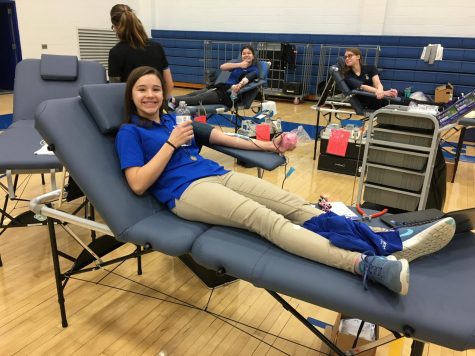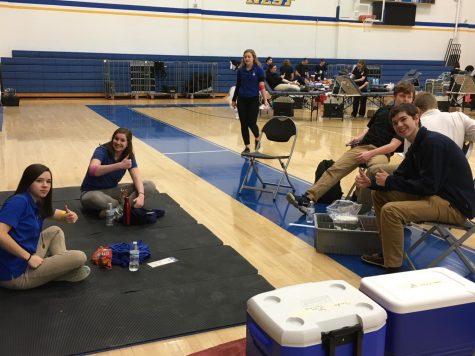Blood Drive Donor Drop?
This past Tuesday, you probably saw the gym filled with cots and medical equipment, all gearing up for the spring Blood Drive. Dozens of students signed up to donate, and medical personal spent all morning carefully collecting donations, which will later be sent to a hospital for use in transfusions, research, and more.

However, this blood drive saw a significant decrease in the number of student donors. Although many students still gave, the length of the drive was cut short because of lower than expected donor numbers. What might have caused this drop?
Eric Leigh, ‘18, says, “I think a lot of drop was because people were in sports, and a lot of people were either deferred or didn’t give because they were sick. We always have some fluctuation in participation for blood drives, and a lot of things go into it. But in general it was pretty heavily advertised, so I would personally credit other factors for the drop rather than lack of information.”
There are many reasons why students might not be able to or might not want to give. Some student are ineligible, and don’t meet the age, weight, or health requirements. Others are worried about something going wrong or don’t like needles. But, as most donors will tell you, it’s still important to donate if you can.
“I’ve donated five times now. Nothing has gone wrong with my donations, so I guess I’m lucky,” says Sam Gilligan, ‘18. “I give blood because it’s a great way to help out, and I get to hang out with friends. Getting out of class doesn’t hurt either.”
We’ve all heard that donating can save up to three lives, but it’s easy to forget just what blood donations can mean. Not every donation will necessarily save
someone’s life, but blood drives are important to ensure hospitals have the blood they need, and it’s better to have too much blood than not enough.
Kaitlin Moran, ‘19, says “I think it’s important for people to donate because the more donors we have, the more lives we can save. I don’t really need all of my blood, and maybe someone else needs it more.”
Gilligan agrees.““I think that this is som ething we can do to help the community, so if you can donate, you should.”
ething we can do to help the community, so if you can donate, you should.”
How to convince people to donate?
“I always try to remind people of the gravity their contribution holds. When I encourage people to donate, I tell them ‘Yeah, nobody want to get a needle in their arm, but nobody wants to die from blood loss because not enough people donated either.’ I think if that’s the general attitude people adopted, we’d see better numbers,” says Leigh.
“I would just tell them not to be afraid of the needles,” says Moran.
Although this was the last Blood Drive this school year, the next time you see an opportunity to give blood, whether it’s at school or in the community, consider signing up. You may just be someone’s type.

